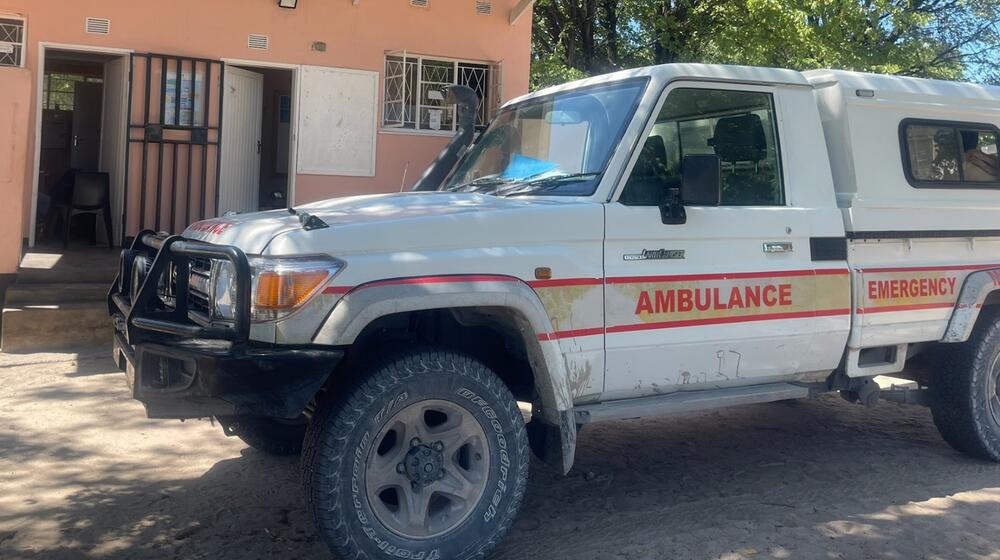News
Leaving no one behind: The UNFPA-backed initiative using drones to connect people with care in Botswana
- 17 July 2023
News
MAUN, Botswana – In the remote village of Mababe, Botswana, getting results from a straightforward blood test is no simple matter.
First, samples must be collected by an ambulance headed for the large northern town of Maun, where there is a major hospital and lab services. Then, the ambulance must cover 116 kilometres of rugged terrain that’s also trafficked by elephants, hippos and other wildlife.
The trip can take three hours or more – when it can be made at all; during the rainy season, flooding shuts the route down entirely.
“The samples have to arrive at the lab in Maun before 11 a.m.,” said Lorato Dambe, a nurse at the Mababe health post. “But that’s not always possible due to the distance and difficult road conditions, leading to possible contamination of samples.”
For too many around the world, health care remains out of reach due to a fundamental problem: Distance. Recent research suggests nearly one in ten people globally live more than an hour’s drive from health care, and almost half of the world lives more than an hour’s walk from it.
While the majority of Botswana’s population lives less than 5 km away from a health facility, there are exceptions – like Mababe. To help close the gap in access, UNFPA and Botswana’s Ministry of Health have launched an initiative that, rather than relying on ground transportation to connect people and care, has taken to the skies: Drones for Health.

The need for speed
The Drones for Health programme, first piloted in Botswana in April 2021, aims to reduce delivery times from hours to minutes for essential medical supplies and samples from health-care hubs to reach remote clinics.
"Speed is everything," said nurse David Selemogwe of the Somelo health post. "If samples sit for a long time, at some point the specimen starts deteriorating. It's not so useful anymore."
Between 25 and 40 per cent of all temperature-sensitive medical supplies sent from urban centres to rural health clinics are wasted because of unreliable cold-chain infrastructure. Rural clinics also often experience stock-outs, leaving patients in need of specialized products and drugs unable to get them.
These are life-threatening access problems that the Drones for Health project hopes to help resolve, largely by leapfrogging traditional modes of transportation.
But it’s not just samples the drones can transport: The idea is also to curb preventable maternal deaths in Botswana through the swift delivery of maternal health supplies, such as blood, equipment and medicine.
“Women can experience massive blood loss due to haemorrhage during childbirth. Blood and blood-based products are therefore critical,” UNFPA Botswana country director Beatrice Mutali explained in 2021.
Botswana has a high maternal death rate, at 166 deaths per 100,000 live births according to 2019 government data. The main causes are postpartum haemorrhage, complications after abortion and hypertensive disorders during pregnancy.
Progress towards averting these deaths has recently stagnated, with the national maternal mortality rate actually increasing between 2015 and 2020. Drones are one creative approach to making headway on reversing this trend.
“Technology and digitally-driven solutions have the potential to transform health care, particularly for women and girls in underserved communities, who are often left behind due to [living] in hard-to-reach areas,” said Ms. Mutali.
Piloting change
Before that happens, however, communities will need to start seeing drones in a different light. Interviews with villagers from Mababe revealed many felt wary of them; 33-year-old mother-of-two Gotang Mmala told UNFPA, for instance, that she associates the word “drone” with suspicious devices spraying poison from the air.
But with time these perceptions might change, especially as the Ministry of Health partners with UNFPA to expand the Drones for Health pilot from Palapye region to include several more villages.
“The drones will improve health-care delivery as they will address terrain constraints and challenges of limited resources, such as vehicles – and reduce preventable deaths,” said Ngami District Health management team coordinator Dr. Sandra Maripe-Ebutswe.